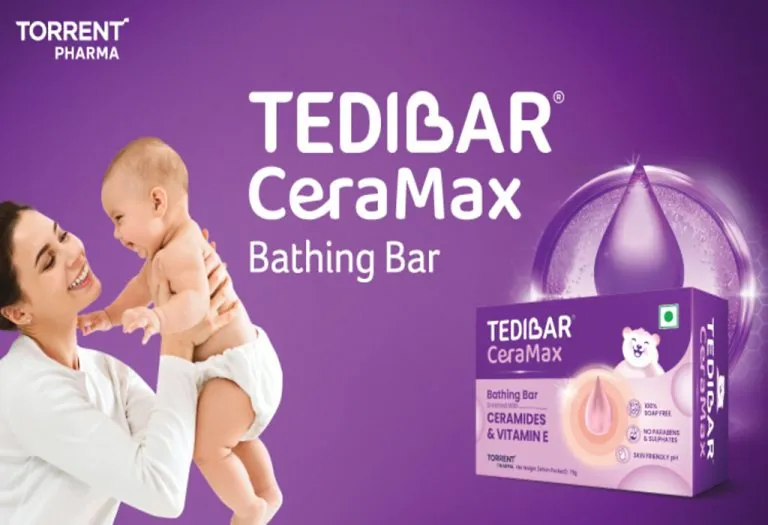Peanuts During Breastfeeding – Health Benefits and Risks

- Is It Safe to Eat Peanuts During Breastfeeding?
- Health Benefits of Peanuts While Breastfeeding
- Risks of Consuming Peanuts While Breastfeeding
- Peanuts Allergy Concerns
- What About Peanut Butter – Is it Safe?
- FAQs
Peanuts are one of the most nutritious food items. Rich in proteins, healthy fats, and a host of vitamins and minerals, peanuts are consumed in a variety of ways. However, research has found that peanut allergies have increased drastically in the last few years, meaning that many pregnant women avoid eating them in order to protect their babies. However, this also applies to breastfed babies, as the mother’s milk can also transfer any allergens or toxins from the mother’s body to the baby. This article will help you understand the health benefits of peanuts during breastfeeding, the risks associated with it as well as any safety concerns regarding your and your baby’s health.
Is It Safe to Eat Peanuts During Breastfeeding?
According to the Canadian Medical Association Journal, peanuts peanut for breastfeeding moms are perfectly safe to eat and even while pregnant, as they pose no harm to the baby whatsoever unless the mother or the baby has an allergy or is sensitive to peanuts (1). Luckily, during breastfeeding, you do not have to stick to the strict pregnancy diet as long as you follow some rules of healthy eating. This means eating a range of foods, such as whole grains, veggies, fruits, legumes, and so on.
Health Benefits of Peanuts While Breastfeeding
Breastmilk is a whole food, meaning it contains all the necessary nutrients for a baby to grow and thrive. It is crucial you consume healthy foods to supplement the nutrients in your milk as well. According to the U.S. Department for Agriculture, peanuts are a great option, as they have several health benefits for both you and your baby (2):
- Folic Acid: Peanuts are rich in folic acid or vitamin B9. This nutrient is vital in the growth of muscle and nervous tissues in the baby, especially during pregnancy. It is also helpful in avoiding any future birth complications.
- Healthy Fats: Peanuts are rich in a variety of unsaturated plant fats. These fats are helpful in the efficient functioning of the circulatory system and the blood vessels. Peanuts are also low in bad cholesterol.
- Proteins: Peanuts are a great source of proteins, which are essential in almost all body processes, such as muscle development, and many others.
- Phosphorus: The phosphorus present in peanuts helps strengthen teeth and bones, and are essential in muscle activity and energy generation in the body.
- Fibre: The high amounts of fibre in peanuts ease digestive processes, preventing problems like constipation. It also makes your stomach feel full and sated.
- Vitamin E: Peanuts have vitamin E, which is required for healthy skin, as well as in protecting cells and the immune system.
- Niacin: Niacin or vitamin B3 is required in the formation and functioning of the digestive organs and the nervous system. It also helps in the production of energy and the formation of supple skin.
- Biotin: This nutrient is essential in the development and maintenance of healthy hair, skin, nails, eyes, nerves, and other organs.
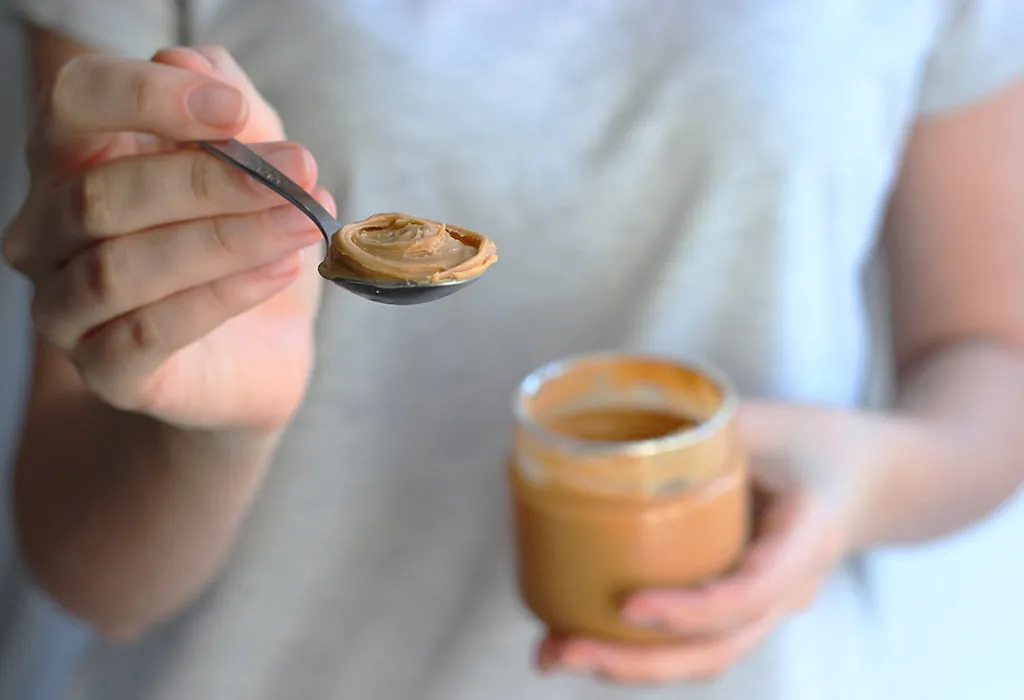
Risks of Consuming Peanuts While Breastfeeding
Peanut allergy through breast milk is possible and is caused by proteins known as allergens, which can cause severe reactions in those sensitive to these molecules (3). This includes rashes, difficulty in breathing, swelling, and often anaphylactic shock, which can be fatal. Does eating peanuts while breastfeeding prevent allergies? As mentioned earlier, nutrients consumed by the mother can pass into the breast milk and affect the baby. However, you can have your baby tested for sensitivity to various foods, including peanuts, by your paediatrician. If your baby does not display any allergy symptoms, you may go ahead and consume these foods.
Peanuts Allergy Concerns
It is important to ensure that your baby does not show any signs of allergy when you eat particular foods. Symptoms of peanut allergy in breastfed babies include rashes, fussing, congestion, diarrhoea, or crying excessively. If this occurs, consult your paediatrician immediately. Finally, if someone in your immediate family, such as your other children, has a peanut allergy, it is safest to avoid them altogether, as there is a possibility your baby might be allergic. Earlier studies were of the opinion that the risk of peanut allergies developing in babies was reduced if the mother avoided eating peanuts during pregnancy and breastfeeding. However, this is not the case. In fact, according to the Journal of Allergy and Clinical Immunology, it is more likely that being exposed to peanuts at a very early age reduces the risks of forming a peanut allergy (4).
What About Peanut Butter – Is it Safe?
Can you eat peanut butter when breastfeeding? Peanut butter is a paste made out of grinding roasted and dried peanuts (5). Therefore, it is as safe to consume peanut butter during breastfeeding as peanuts themselves.
FAQs
1. Should breastfeeding mothers avoid peanuts if they have a family history of allergies?
Breastfeeding mothers with a family history of peanut allergies should consult with a healthcare professional before consuming peanuts. In some cases, avoidance may be recommended to reduce the risk of allergic reactions in the baby. However, recent research suggests that early introduction of peanuts may actually help prevent allergies in high-risk infants.
2. Can eating peanuts while breastfeeding affect breast milk production or quality?
There is no evidence to suggest that consuming peanuts in breastfeeding negatively affects breast milk production or quality. In fact, peanuts are a good source of nutrients that may support lactation. However, if a breastfeeding mother notices any changes in her milk production or her baby’s behavior after consuming peanuts, she should consult with a healthcare provider.
3. How should peanuts be introduced into a breastfeeding mother’s diet?
If peanuts are not a known allergen in the family and the breastfeeding mother has not experienced any allergic reactions herself, they can be introduced into her diet gradually and in moderation. Starting with small amounts and monitoring the baby for any signs of allergic reactions is recommended. If there are concerns about allergies, it’s best to consult with a healthcare professional before introducing peanuts into the diet.
4. Are there any other foods or substances breastfeeding mothers should avoid in conjunction with peanuts?
In addition to peanuts, breastfeeding mothers should be cautious about consuming other common allergens such as tree nuts, shellfish, and dairy products if there is a family history of allergies or if the baby shows signs of sensitivity. It’s important to maintain a balanced diet while breastfeeding, but if there are concerns about potential allergens, consulting with a healthcare provider for personalized advice is advisable.
This was all about peanuts and breastfeeding. If you are breastfeeding, then you will need to consume around 500 more calories every day. A part of this energy can come from peanuts or peanut butter, as these foods have only highly nutritious components like healthy fats, proteins, omega-3 fatty acids, vitamins, and minerals. As long as you, your baby or anyone in your family has no peanut allergy, there is no need to be concerned.
References/Resources:
1. Abrams. E, Sicherer. S; Maternal peanut consumption and risk of peanut allergy in childhood (Canadian Medical Association Journal); National Library of Medicine; https://www.ncbi.nlm.nih.gov/pmc/articles/PMC6041250/; July 2018
2. Peanuts, all types, raw, Food Data Central; U.S. Department of Agriculture; https://fdc.nal.usda.gov/fdc-app.html#/food-details/172430/nutrients
3. Vadas. P, Wai. Y, Burks. W; Detection of Peanut Allergens in Breast Milk of Lactating Women; JAMA Network; https://jamanetwork.com/journals/jama/fullarticle/193696
4. Pitt. T, Becker. A, Chan-Yeung. M, et. al.; Reduced risk of peanut sensitization following exposure through breast-feeding and early peanut introduction; The Journal of Allergy and Clinical Immunology; https://www.jacionline.org/article/S0091-6749(17)31104-1/fulltext
5. Peanut butter; Food Data Central; U.S. Department of Agriculture; https://fdc.nal.usda.gov/fdc-app.html#/food-details/1100559/nutrients
6. Peanut Allergy; La Leche League International; https://llli.org/news/peanut-allergy-2/
7. Breastfeeding and a Mother’s Diet: Myths and Facts; La Leche League GB; https://laleche.org.uk/breastfeeding-and-a-mothers-diet-myths-and-facts/
Also Read:
Green Tea when Breastfeeding
Can I Eat Honey while Breastfeeding?
Eating Chocolate during Breastfeeding
Is Coffee/Caffeine safe during Breastfeeding?
Was This Article Helpful?
Parenting is a huge responsibility, for you as a caregiver, but also for us as a parenting content platform. We understand that and take our responsibility of creating credible content seriously. FirstCry Parenting articles are written and published only after extensive research using factually sound references to deliver quality content that is accurate, validated by experts, and completely reliable. To understand how we go about creating content that is credible, read our editorial policy here.







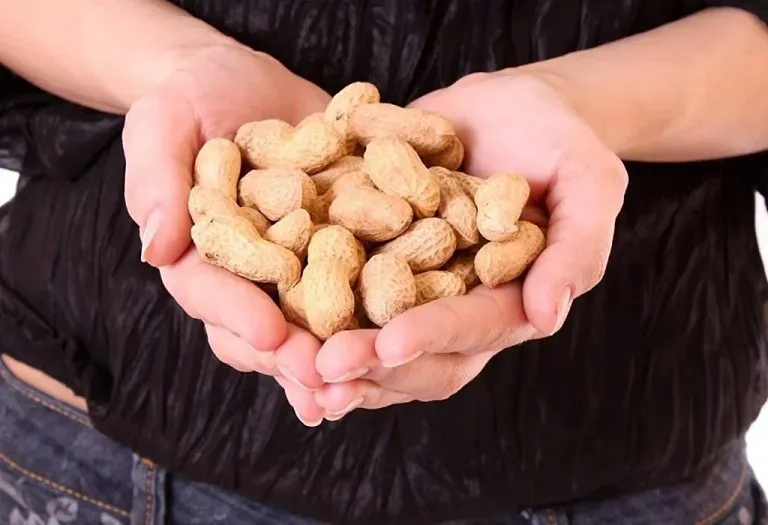
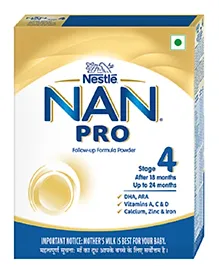
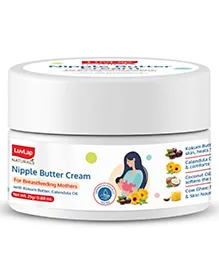

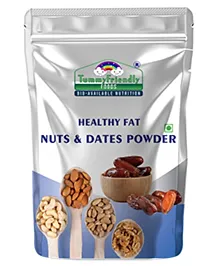


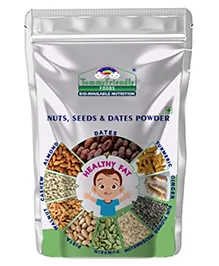
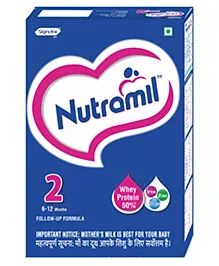
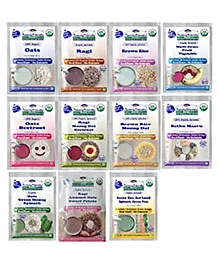







.svg)










